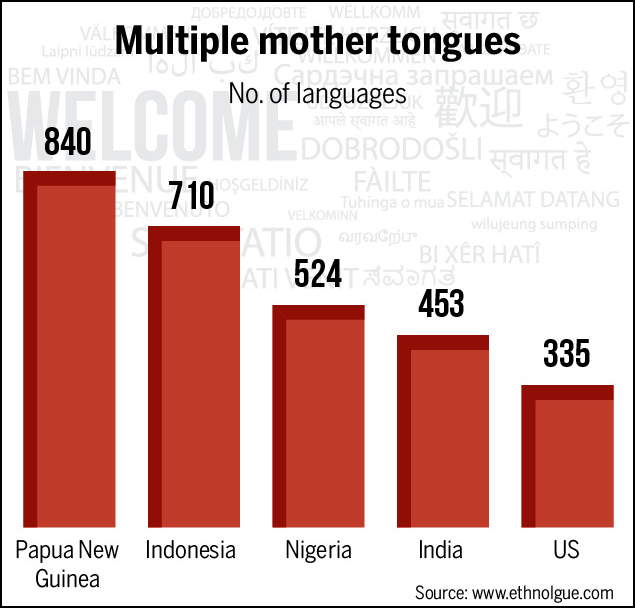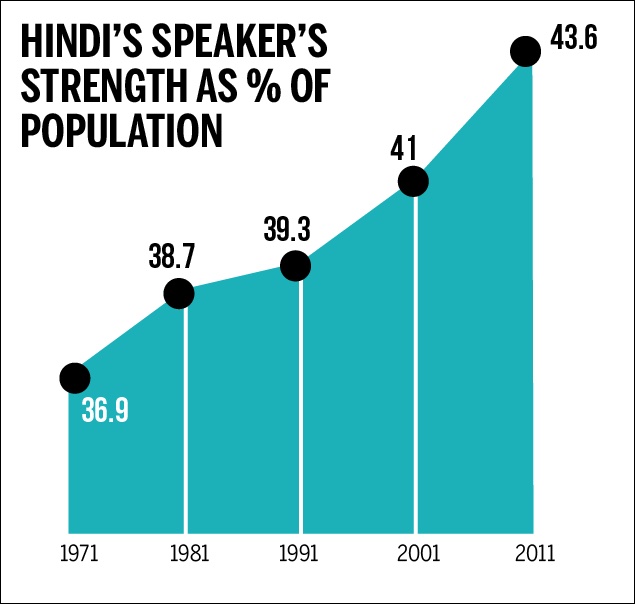The Languages of India
This is a collection of articles archived for the excellence of their content. Additional information may please be sent as messages to the Facebook community, Indpaedia.com. All information used will be gratefully acknowledged in your name.
This is a collection of articles archived for the excellence of their content. |
Contents |
Languages spoken in India
As in 2011
February 21, 2020: The Times of India

From: February 21, 2020: The Times of India

From: February 21, 2020: The Times of India

From: February 21, 2020: The Times of India

From: February 21, 2020: The Times of India

From: February 21, 2020: The Times of India

From: February 21, 2020: The Times of India

From: February 21, 2020: The Times of India

From: February 21, 2020: The Times of India
Language for all- India examinations
Test can’t be in just Hindi, English: HC
K Kaushik, Oct 26, 2021: The Times of India
The Madras high court has suspended an aptitude test for a centrally-sponsored scholarship programme — Kishore Vaigyanik Protsahan Yojana (KVPY) — slated for November 7 as the examination was to be held only in English and Hindi.
The first bench of Chief Justice Sanjib Banerjee and Justice M Duraiswamy ordered the postponement of the test while hearing a plea that sought the exam in all regional languages. The court also sought response from the Centre on the steps taken to conduct the exam in multiple Indian languages.
Rejecting the Centre’s submission that it does not have adequate personnel to assess answers given in various languages and that it may be difficult to find an equivalent term in local languages for scientific words and terminologies, the judges said, “It would not do for the Centre to say that it does not have qualified assessors to appreciate the material put up by non-Hindi- and non-English-speaking aspirants. If at all, it is the deficiency with the Centre, and young aspirants from non-Hindi- and non-English-speaking belts in the country should not suffer on such grounds.”
KVPY is a national programme of fellowship in basic sciences funded by the Centre’s department of science and technology. The main objective of the exam is to identify students with talent and aptitude for research, to help them realise their academic potential and to encourage them to take up research careers in science by providing fellowships. Even if it is a token scholarship of Rs 5,000, it amounts to recognition of a young mind, said the court.
The local language and students from outside the state
The local language cannot be imposed on outside students
Oct 27, 2021: The Times of India
Can’t force outside students to learn Kannada, says HC
BENGALURU: Students coming from outside Karnataka cannot be compelled to learn Kannada language, be it classical or functional, the high court orally observed, granting time to the state government to reconsider the issue.
A division bench headed by Chief Justice Ritu Raj Awasthi adjourned the hearing to November 10 vis-a-vis a petition challenging two government orders making Kannada a compulsory subject for degree students, following a request from advocate-general Prabhuling K Navadgi.
“With the understanding that the government will reconsider the issue, we adjourn the matter,” the division bench orally said. Earlier, the advocate general said people have to learn Kannada for employment purpose and they need not learn Kannada in a classical sense and he would get more instructions in the matter. However, the bench queried as to how the state government can compel a student coming from outside to learn Kannada and added that the state government has to reconsider the issue and the court will grant time for the same. Senior advocate SS Naganand, appearing on behalf of the petitioners, told the court that the academic year had already commenced and students will have to make a choice.
Orders take away freedom to choose language: Petitioners
Samskrita taka) Trust Bharati , Bengaluru (Karna , - and three other institutions associated with the promotion of Sanskrit language/ study have filed this petition, challenging the validity of government orders dated August 7, 2021 and September 15, 2021, saying it goes against National Education Policy.
The petitioners have sought declaration to the effect that NEP 2020 does not impose any restriction upon the student to choose any particular language as part of the curricula for higher education. According to the petitioners, it will impede the admissions and rights of minority institutions, students and especially the teachers who are at the risk of losing employment as the options of choosing a language is now restricted.
They claim 1.3 lakh students and 4,000 teachers, who were teaching Sanskrit (600 teachers), Hindi (3,000 teachers), Urdu (300 teachers) and other languages (100 teachers), are going to be affected by this move of the government.
“The said orders take away the freedom to choose a language for study and makes it mandatory for all students in Karnataka to take up Kannada as a language in degree courses offered in all streams of science, commerce and arts. There is a restriction on the freedom of speech and expression enshrined under the Constitution. Though, Article 19(2) of the Constitution enables the state to impose restrictions upon the fundamental rights, the restrictions ought to be reasonable..,” the petitioners contended.
Further, they have argued that equating those students who have not studied Kannada at any point time till plus level with those who have studied Kannada is also equally opposed to Article 14 of the Constitution.